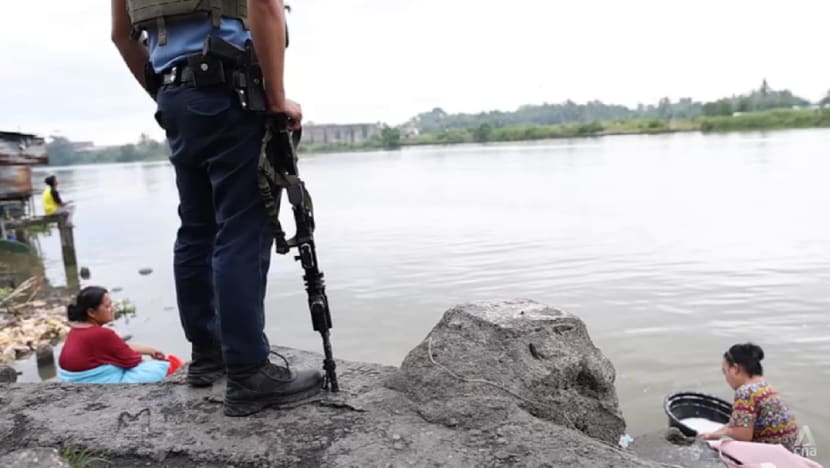Former rebels in southern Philippines trade bullets for ballots
Maintaining peace in its volatile Bangsamoro region is important for the Philippines, amid its bid for one of the 10 non-permanent seats on the United Nations Security Council.

A security personnel stands guard with a firearm as women wash clothes along a river in the autonomous Bangsamoro region on the southern Philippine island of Mindanao.

This audio is generated by an AI tool.
MINDANAO: The Philippines' Muslim-majority autonomous Bangsamoro region has seen significant progress in the decade since a peace deal with a separatist group was signed.
The region has improved access to education and healthcare, attracted investments and grew its economy.
Its poverty rate also dropped substantially from 52.6 per cent in 2018 to 23.5 per cent in 2023, and was no longer the poorest region in the country, according to data released last year.
This October, the self-ruled region on the southern Philippine island of Mindanao is set to hold its first parliamentary elections.
But for the Muslim natives there, painful memories from the area’s long history of conflict remain.
Tarhata Tarapas, a member of the Moro people who are Muslim Filipinos living in Bangsamoro, said she would never have been allowed to work as an educator in the past.
“The Bangsamoro people were denied education. We were always hiding in remote areas. Our women hid. (They were) raped. Our rights were repressed,” the 57-year-old told CNA.
Today, she is head of the Sarmiento West Elementary School in Parang municipality, the designated seat of the Bangsamoro government.
The autonomous region was established in 2019 after a referendum that would give the region greater control of its resources.
It followed a peace agreement in 2014 between the Philippine government and the rebel Moro Islamic Liberation Front (MILF) that ended nearly four decades of fighting.
PUSH FOR TRUTH COMMISSION
The MILF was the largest Muslim separatist group to emerge from a rebellion that began in the late 1960s.
The movement was rooted in years of injustice, including the forced resettlement of Christians from the north to the Moro's lands in the south.
Advocates are urging the national government of Catholic-majority Philippines to create a Truth Commission that would acknowledge and compensate the Muslim community for decades of prejudice.
Some fear that President Ferdinand Marcos Jr may not support the creation of such an official body to recognise and provide reparations for the injustice.
The initial violence - the killing of hundreds of Muslim recruits in 1968 known as the Jabidah massacre - happened under the presidency of his father Ferdinand Marcos Sr.
Still, the Bangsamoro government's spokesperson Mohd Asnin Pendatun said he is confident Marcos Jr is supportive of the peace process.
“The peace process started during the time of Marcos Sr, and it would be a very fitting story if we could end the peace process on a positive note, (with Marcos Jr),” he said.
FRAGILE PEACE
However, violence that continues to break out sporadically threatens the fragile peace in the region.
Three months ago, members of the Philippine military tasked with escorting humanitarian workers on the island province of Basilan were attacked by armed men. Two soldiers died and 12 were injured.
MILF’s peace negotiator Mohagher Iqbal said some members involved in the clash have pending arrest warrants, leading them to react suspiciously to state forces entering the group’s strongholds.
“On the part of the MILF, I don’t think we have other options. The only option right now is the pursuit of peace in Mindanao. We need to remain … friends. Meaning, you can be hard on issues, but you have to be soft on people,” he said.
Some MILF members and leaders have pending criminal cases against them. They have applied for amnesty, asking the national government to speed up their applications before October’s elections so they can transition from former rebels to a life as civilians and politicians.
BANGSAMORO’S MINORITIES
However, the minority non-Muslim indigenous people in the region are concerned they could be left behind in the polls.
Nearly 80 of them in and around the Bangsamoro region have been killed between 2018 and 2024 over land disputes and political differences, among other factors.
In response, the region passed an Indigenous Peoples' Code last year, which aims to ensure the just delineation of land and the protection of non-Muslims indigenous people’s rights.
But experts argue the granting of ancestral land should be left to the national government.
“A part of the peace process in the Bangsamoro is autonomy, but autonomy does not mean exclusivity,” said Faydah Dumarpa, commissioner of the Philippines’ Commission on Human Rights.
“Therefore, the National Commission on Indigenous Peoples, being the state agency, still has the authority to address and resolve the claims of our non-Moro indigenous people.”
PEACE PROCESS
Part of the peace process in the volatile region involves the gradual laying down of arms.
International development agencies have expressed willingness to pitch in and help the regional government provide non-monetary incentives for civilians who willingly surrender their unregistered firearms.
However, many newly confiscated weapons were found homemade and improvised, underscoring the gun culture that continues to exist in the region.
Beyond the Bangsamoro region, the country has also successfully defeated the secessionist-turned-bandit Abu Sayyaf Group after more than 30 years.
The battle-hardened general now in charge of the division that disbanded the group said the path towards peace was not achieved solely through military means.
“If you are only dealing with war through the guns that you are holding, the problem cannot be resolved,” said Major General Leonardo Pena, commander of the Philippine Army’s Joint Task Force Orion.
“You need to have the right mind and commitment … to also deal with affected families. We were able to somehow win the hearts and minds of the people.”
A former Abu Sayyaf member said financial aid and livelihood support provided by the Philippine government had enticed others like him to surrender.
“I will never forget how we starved. We ate food even monkeys wouldn't eat. Now … if I have a job, I can afford more things. That's the difference now,” he told CNA.
Ensuring lasting peace in the Bangsamoro region is important for the Philippines, especially amid its bid for one of the 10 non-permanent seats on the United Nations Security Council in 2027.














